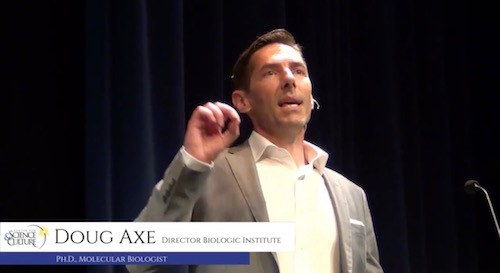Discovery Institute's Blog, page 53
July 17, 2016
How Could We Know if Animals Can Think Abstractly?

I have laid out in previous posts the evidence that animals are not capable of abstract thought. Furthermore, it is unclear what kind of abstract thought an animal could have, given that animals have no language in which to express abstract concepts. If an animal isn't thinking about a particular thing or about a word, what would the animal be thinking about?
But the question can be asked: How could we detect abstract thought in an animal?
Here's how. The experimental design necessary to de...
July 16, 2016
American Medical Association Playing "Hide the Ball" with Futile Care Rule?

"Futile care" is ad hoc health care rationing. It permits a doctor to refuse wanted life-sustaining treatment that is working, based on the values of the MD that keeping the patient alive is not the "medically appropriate" approach.
The term "medically appropriate" in such cases is a misnomer. The "refuse wanted treatment decision" is really a subjective values judgment of the doctor, as opposed to an objective medical determination. Or to put it another way, the treatment isn't refused beca...
July 15, 2016
Helpful Survey of the Best ID Literature Illuminates Distortions of the Evolution Debate

Marvin Olasky of World Magazine has a very helpful survey of recent literature challenging Darwinism and offering alternatives, including a variety of books from authors arguing for intelligent design -- most recently Doug Axe's Undeniable. "Axe," he summarizes, "shows how Darwinists who want us to suppress our intuition avoid looking at the gaping hole in their theory."
Olasky does a great job in presenting a comprehensive picture of the books that are out there. He also includes creationis...
David Hume Notwithstanding, Abstract Thought in Animals Is a Myth

Atheist mathematician Jeffrey Shallit:
There is... evidence for abstract thought in animals other than people. Evidence exists for dogs, baboons, and crows, to name just three examples. Of course, all these examples are debatable (although I find these and others pretty convincing), and will likely continue to be debated until we know more about how abstract concepts are represented and processed in brains. Nevertheless it is pretty obvious that this is a question that, at least in principle...
Celebrating the Release of Undeniable, Doug Axe Offers an Excellent Summary of the Argument; Watch It Now
Wednesday night's celebration at McCaw Hall in Seattle was more than just a "book party," which is what we've called it, somewhat inaccurately. A book party implies people standing around sipping cocktails and sampling hors d'oeuvres. That was not what happened. Instead, the evening was an outstanding presentation by Douglas Axe of the argument of his new book, Undeniable: How Biology Confirms Our Intuition That Life Is Designed, published this week by Harper One.

The book itself is admirab...
July 14, 2016
When a Light Bulb Went On for Doug Axe
Dr. Axe's new book, Undeniable: How Biology Confirms Our Intuition That Life Is Designed, will turn on a light bulb for many readers. When, though, was his own "Aha!" moment?
He describes it above. It came early on in his Caltech graduate studies:
I suddenly saw this connection between what I had studied as an engineer and biology -- specifically, how things are controlled at the molecular level in gene expression. I saw this elegant regulatory mechanism described in a lecture and I thought...
Starling Murmurations and Intelligent Design, Revisited
A friend points out the bit of nice news that one of our favorite nature video clips, "Dylan Winter and the Starling Murmurations," from the Illustra film Flight: The Genius of Birds, has exceeded a million views on YouTube. Not bad. That's a million plus people exposed to one of the most remarkable demonstrations of the wonders of bird flight.
All those viewers may not know precisely how starling murmurations give evidence of intelligent design. We've discussed this in the past:
What Is Consciousness?

The most intractable question in modern neuroscience and philosophy of the mind is often phrased "What is consciousness?" The problem has been summed up nicely by philosopher David Chalmers as what he calls the Hard Problem of consciousness: How is it that we are subjects, and not just objects? Chalmers contrasts this hard question with what he calls the Easy Problem of consciousness: What are the neurobiological substrates underlying such things as wakefulness, alertness, attention, arousal...
July 13, 2016
"To What or to Whom Do We Owe Our Existence?" Find Out Now as We Live Stream the Undeniable Book Party
In his new book Undeniable: How Biology Confirms Our Intuition that Life Is Designed, molecular biologist and Biologic Institute director Douglas Axes brings an engineering perspective to the ultimate question human beings can ask: "To what or to whom do we owe our existence?"
Join us NOW as we live stream a celebration of this important new book, with remarks by leading scholars and scientists in the circle of ID research, including Dr. Axe himself. It's happening this moment, 7:30 pm from...
Perfect Illustration of Why We Need Undeniable

I received this tweet from a fellow who, unless I'm misled by Google, is Assistant Professor & Program Director, Elementary Education Undergraduate Program, University of North Carolina at Charlotte:
"Scientifically valid?" Was that determined by extensive peer review in the scientific community? https://t.co/rlO3dDWJwi
— Ian Binns (@icbinns) July 13, 2016
He was responding to me here, a thumbnail summary of the thesis of Doug Axe's new book:
The natural intuition of design is not only innat...
Discovery Institute's Blog
- Discovery Institute's profile
- 15 followers




